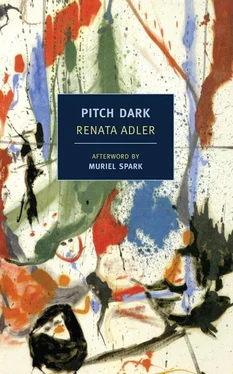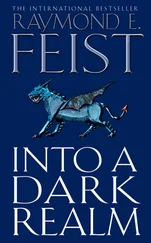Renata Adler - Pitch Dark
Здесь есть возможность читать онлайн «Renata Adler - Pitch Dark» весь текст электронной книги совершенно бесплатно (целиком полную версию без сокращений). В некоторых случаях можно слушать аудио, скачать через торрент в формате fb2 и присутствует краткое содержание. Год выпуска: 2013, Издательство: NYRB Classics, Жанр: Современная проза, на английском языке. Описание произведения, (предисловие) а так же отзывы посетителей доступны на портале библиотеки ЛибКат.
- Название:Pitch Dark
- Автор:
- Издательство:NYRB Classics
- Жанр:
- Год:2013
- ISBN:нет данных
- Рейтинг книги:3 / 5. Голосов: 1
-
Избранное:Добавить в избранное
- Отзывы:
-
Ваша оценка:
- 60
- 1
- 2
- 3
- 4
- 5
Pitch Dark: краткое содержание, описание и аннотация
Предлагаем к чтению аннотацию, описание, краткое содержание или предисловие (зависит от того, что написал сам автор книги «Pitch Dark»). Если вы не нашли необходимую информацию о книге — напишите в комментариях, мы постараемся отыскать её.
Pitch Dark Composed in the style of Renata Adler’s celebrated novel
and displaying her keen journalist’s eye and mastery of language, both simple and sublime,
is a bold and astonishing work of art.
Pitch Dark — читать онлайн бесплатно полную книгу (весь текст) целиком
Ниже представлен текст книги, разбитый по страницам. Система сохранения места последней прочитанной страницы, позволяет с удобством читать онлайн бесплатно книгу «Pitch Dark», без необходимости каждый раз заново искать на чём Вы остановились. Поставьте закладку, и сможете в любой момент перейти на страницу, на которой закончили чтение.
Интервал:
Закладка:
Not here, Diana said. This is about friendship, and my tantrum, and how I both was and failed to be a citizen of my time. One would never have guessed they were a couple. She seemed so much older, of no clear age, but of another generation, it seemed certain, than he was. She was dark, heavy, in some way altogether ancient beautiful, by birth and accent Greek. He was slight, slim, boyish, by accent and manner unmistakably New England; well-traveled, though, bright, worldly, wearing his parka, over sweater, tennis shoes, and jeans, against the wind. One would have thought him, at the very oldest, twenty-eight. When it turned out, hours after the first introductions, incompletely understood, that they were, in fact, a couple, John and Diana Cummings, it turned out as well that he was, must be, from his first accounts of his life and education, forty-five, and she, it became clear, could be no more than ten years older. Even then, they seemed so oddly matched, so unmatched, that one thought they must have met and married only recently. He, seeking in his boyishness a mother, perhaps, or a guardian. She, seeking a son perhaps to look after and protect. They had, in fact, been married more than twenty years. They had two daughters; also, a son, of whom they rarely spoke. Here’s what happened on the first evening, at dinner. Somebody asked me what I was working on. I said, A piece about the American passport. Ah yes, said the Austrian photographer, a good subject. And she told of her travails in being admitted to the United States. She was asked, of course, whether she had been a Communist, but also whether she had ever committed adultery. What a question, she said. If I were a Communist or an adulteress, did they think I would say yes? I spoke of the belief I had been brought up with, the particular trust and belief in the American passport. And of how incomprehensible it was to me that any person, government, or bureau should treat it lightly or foolishly, in the matter of regulation, or in any other matter at all. I mentioned that I keep, that my family have always kept, constantly renewed and valid passports. Then it struck me, briefly, vaguely, that, in the matter of trusting and not trusting one’s country, a constantly renewed passport cuts both ways. But by this time, Diana had mentioned her own passport, her Greek passport, which had been revoked on account of her activity abroad against the junta. She had, nonetheless, managed, with courage and with an anomalous French passport, to keep traveling, in and out of Greece, but also, once, to Turkey. I asked her about her colleague, the Portuguese feminist and journalist, who had just published a short novel about her lover, an Armenian poet, who died in a Greek prison. And Diana said, Yes, we wanted her to write about another prisoner, but Maddalena insisted it be he. Then, she laughed. In those days, she said, we still believed in publicity, that it matters. She laughed again. I said, What do you mean? What do you now think matters? And she said, Violence.
The passport, I had noticed, was growing smaller, over the years, and changing fabric. I had learned from the dragon of the passport office that they even planned to diminish it, within a year or two, to the size and texture of a credit card. To avoid fraud, they said, but also, and there seemed to me an unconscious totalitarian longing in this, to serve, as papers required on one’s person in police states have always served, as permanent proof of citizenship, and of identity.
But in London, don’t you see, the phone rang. In London, on Hays Mews in fact, the phone rang. I was asleep. He said, You’ve left. I said, I haven’t. He said, You have.
But will they understand it if I tell it this way?
Yes, they will. They will surely understand it.
But will they care about it?
That I cannot guarantee.
I said, What do you mean? What do you now think matters? And she said, Violence. Diana had also said, The only ones who helped us in those days were the Palestinians. But we had just met, and I didn’t even know who “us” was or what, helped with what, so I let it pass. And then, when only she and John and I were still at the table, she said, I understand everything about Greek drama now. And she told of having asked an old Greek in a little mountain village whether he had ever heard of Diana; she meant the goddess. He had replied: I never met her, but she was very beautiful; my grandfather knew her very well. Then she said, What I understand about Greek tragedy now is this: the Athenians went to three dramas in a single day, and at the end they were so exhausted, that was the catharsis. The exhaustion itself was the catharsis. She and John and their daughter had gone, it seems, to a therapy group, in Lausanne, where they live. And the daughter had gotten up, one of the first to speak, and said many things about her parents. John had gotten up to answer, doing so quietly, in his way and so as not to hurt his daughter, and crying as he spoke, which is not at all his way or the way of that sort of American. Then, it was Diana’s turn. She had looked around, she said, and thought, These worms, I can do this easily, these worms, particularly as I have been through a lot in my life, and now I am going to act, that is perform. But somewhere in the course of her speaking she was moved to tears, and when she had finished, the leader, knowing that this marked an emotional caesura for the whole group, called an intermission. And during the intermission the gathering broke as it were into three large factions, some with John, some with Diana, but a great wave bearing her daughter toward Diana, wanting reconciliation, a scene. Diana thought again, These worms. And, as her daughter was borne directly to her, crying, Diana said, “Not here.” But this is not about that. In the end, this is not about that, though that “Not here” had immense repercussions for me. This is about friendship, and my tantrum, and how I both was and failed to be a citizen of my time.
These are the categories: arbitrary, necessary, futile. Intimate, public. These are the characters, these are the events. Over here, are the strategies and theories. Cadences. And in London, after all, there were the phone calls. Sometimes I was asleep, sometimes you were.
This is a conservative, even a reactionary town, and yet, every year since anyone can remember, it has been the only town in the state to have a Labor Day parade. Frank and Marilyn, my nearest neighbors, are conservative, even reactionary voters. We became friends in the first week I moved here. Marilyn brought a flowering plant in welcome, stayed for coffee and a cigarette, then called to ask whether I would like to come to dinner the following night at five o’clock. Five o’clock, I thought, farmers’ hours, country people’s hours, although our farming neighbors, when I was growing up, I dimly recalled, had dinner more nearly at six or even six-thirty, and though I knew that Frank and Marilyn are not farming people. She runs a private kindergarten; he is an engineer. When I arrived at their house, there was for some time no question at all of eating. They were already drinking, and I joined them. When we did finally have dinner, hamburgers, I think, with spaghetti sauce and wine, it was long after eleven. And by the time I crossed the road, through the chill air, to my house, we had told each other more than some close friends of many years. Just as well. Our driveways are close enough for us to see who comes and goes, and, from time to time, hear bits of conversation, borne with improbable clarity on the night wind. What we would have known anyway, as neighbors, we know instead as friends. They are kind, educated, tolerant, church-going people, with their own history of trouble, bordering at one time on local scandal; and when I mention what I think of as their conservatism, quite apart from how they vote, I mean, for instance this: at odd hours, motorcycles and heavy trucks have begun of late to thunder at high speeds along our road, using it as a short cut between one highway and another. Apart from the noise, this back road, which is narrow and winding, was not meant for speed, or for the weight and width of trucks. In winter, especially, there are always crashes. When some neighbors suggested a petition, to post signs lowering the speed limit and also reading No Thru Trucks, Frank and Marilyn refused to sign. They so disliked the Sierra Club, Clamshell Alliance overtone, they said. This position carried in our neighborhood. All winter there will again, presumably, be crashes. But Frank says it is clear, at least, that this is not and will never be a Clamshell Alliance sort of town.
Читать дальшеИнтервал:
Закладка:
Похожие книги на «Pitch Dark»
Представляем Вашему вниманию похожие книги на «Pitch Dark» списком для выбора. Мы отобрали схожую по названию и смыслу литературу в надежде предоставить читателям больше вариантов отыскать новые, интересные, ещё непрочитанные произведения.
Обсуждение, отзывы о книге «Pitch Dark» и просто собственные мнения читателей. Оставьте ваши комментарии, напишите, что Вы думаете о произведении, его смысле или главных героях. Укажите что конкретно понравилось, а что нет, и почему Вы так считаете.












